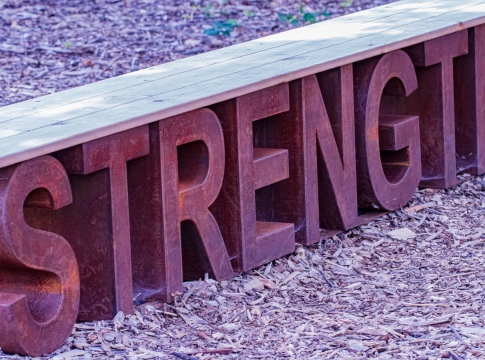
With God there is our sure refuge
The Hebrew verb “sagav,” which is rare yet important, is the root of the word “misgav.” To begin with, let me explain this verb “sagav,” which means to be elevated or exalted. However, this term also indicates to be safe, untouchable, and impregnable. This phrase, which is particularly common in poetry, refers to a safe height that is impenetrable, a lofty protective canopy that is off-limits to foes and danger. Owing to these interpretations, this verb is particularly used in relation to the Lord God.
The less often used word “misgav,” which meaning “safe height, rock, fortress, stronghold, refuge, high shelter,” comes from this verb. In general, the term refers to a safe haven that is unassailable and provides protective security, a refuge. This word is also primarily used in relation to God, representing and expressing the safety and security that He provides to those who run to Him. Similar to the verb from which it is derived, the term “misgav,” or refuge, appears mostly in the Psalms and also appears three times in relation to the Prophets.
Human strongholds fall
Isaiah 25
A hymn of praise and gratitude that foretells a magnificent feast for the redeemed can be found in Isaiah 25. While those who, like Moab, put their reliance in themselves perish (verse 10) and will not partake in the deliverance proclaimed here, those who wait for the Lord will be saved (verse 9). “O Lord, You are my God,” the song declares in its opening line. It closes with the prophecy that the “misgav” or high fortifications of his walls will be brought down, laid low, and flung to the ground, to the dust” (verse 12). That is the fate of human strongholds.
Jeremiah 48
The prophet Jeremiah prophesies about two major cities in Moab with which Israel had much to contend – Nebo and Kiriathaim – and announces their eventual fall. The pride of these cities will perish, for they are taken, destroyed, and put to shame; the “misgav” / certain stronghold is shattered (verse 1). The word “misgav” can also be taken here as a place name: “Misgav”. In this case the prophet speaks of three cities that will be destroyed. The reason for this is Moab’s pride and arrogance (14, 29-30) and “… magnified himself against the Lord …” (verse 26, 42)[1]. Yet from that very nation a humble woman had come to take refuge “… under whose wings you have come to take refuge!” (Ruth 2:12). Ruth teaches us that only in the Lord is the true “misgav” / secure refuge.
God’s sure fortress
Isaiah 33
The one who turns from sin and lives devotedly to God will discover Him presenting a high rock as “misgav” / refuge in distress (verse 16) and will see that He has all power and reigns as King (verse 17) in dangerous, terrifying situations (Isaiah 33).
Psalms
In addition, David describes the high rock as a secure haven, saying, “My God, my rock, in whom I take refuge, my “misgav”/shield.” (See 2 Samuel 22:3; Psalm 18:2). It is particularly clear from the Psalms. The psalmist states that the Lord is a “misgav” or stronghold for the downtrodden and a “misgav” or stronghold in times of adversity in his hymn of thanksgiving for deliverance obtained. (Psalm 9:9).
Indeed, our fortress is the Lord! This is also sung of in Psalm 46. The first line of this psalm describes what God is to us: a place of refuge, strength, and support throughout difficult times. Thus, we won’t be afraid. Even if there are terrible and dangerous situations in life (verses 2–6), we know that “The Lord of hosts is with us; the God of Jacob is our “misgav” / fortress” (verses 7, 11). Additionally, Psalm 48 mentions God’s omnipotence in a song of praise for Zion’s splendor. “God has revealed himself to her citadels as a “misgav” or refuge.” (verse 3).
God’s protective safety
In a time of distress, David addresses God directly in a petition (Psalm 59), explaining his predicament and pleading for His deliverance (verses 1–7). He cries, “I will watch for You, because You, O God, are my “misgav” / refuge,” in the midst of all the suffering (verse 9). He acknowledges that he will sing, “Because you have been to me a “misgav” / fortress,” of God’s power and grace (verse 16).
Once more, David expresses his reliance on God during difficult and trying times (Psalm 62). Knowing that salvation is a gift from God brought him deep serenity (verse 1). In lines two and six, he acknowledges that “He alone is my rock and my salvation, my “misgav” / fortress; I shall not be greatly shaken.” Deep phrases to recite throughout difficult, uncertain, and depressing times…
However, the Lord has grown to be my “misgav” or stronghold. (Psalm 94:22). He is my rock, my stronghold, my “misgav” (high shelter)…(Psalm 144:2).
Note
Furthermore, Moab has consistently shown animosity toward Israel; see Numbers 21–24 and Deuteronomy 23:3–4.
©Copyright A. Sneller-Vrolijk





